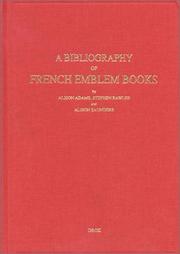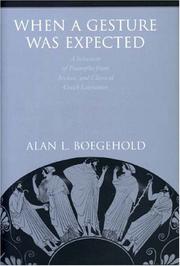| Listing 1 - 4 of 4 |
Sort by
|

ISBN: 2600003576 2600006761 9782600006767 9782600003575 Year: 1999 Volume: 331, 362 Publisher: Genève: Droz,
Abstract | Keywords | Export | Availability | Bookmark
 Loading...
Loading...Choose an application
- Reference Manager
- EndNote
- RefWorks (Direct export to RefWorks)
Book history --- anno 1600-1699 --- anno 1500-1599 --- France --- Emblem books, French --- Emblems --- History --- Emblèmes --- Livres d'emblèmes français --- 840-1 "15/16" --- 094:82-84 --- 840-84 --- Franse literatuur: poëzie--?"15/16" --- Oude en merkwaardige drukken. Kostbare en zeldzame boeken. Preciosa en rariora-:-Emblemen. Spreuken. Citaten --- Franse literatuur: spreuken; citaten --- 840-84 Franse literatuur: spreuken; citaten --- 094:82-84 Oude en merkwaardige drukken. Kostbare en zeldzame boeken. Preciosa en rariora-:-Emblemen. Spreuken. Citaten --- 840-1 "15/16" Franse literatuur: poëzie--?"15/16" --- Emblem books [French ] --- Bibliography --- Emblem books --- Emblem books [Dutch ] --- Emblem books, French - Bibliography --- Emblems - France - History - 16th century - Bibliography --- Emblems - France - History - 17th century - Bibliography
Book
ISBN: 0404637132 Year: 1999 Publisher: New York, N.Y. AMS
Abstract | Keywords | Export | Availability | Bookmark
 Loading...
Loading...Choose an application
- Reference Manager
- EndNote
- RefWorks (Direct export to RefWorks)
Art and literature --- Emblem books, English --- Emblems --- English poetry --- Renaissance --- Revival of letters --- Civilization --- History, Modern --- Civilization, Medieval --- Civilization, Modern --- Humanism --- Middle Ages --- English literature --- Heraldry --- Signs and symbols --- Symbolism --- English emblem books --- Literature and art --- Literature and painting --- Literature and sculpture --- Painting and literature --- Sculpture and literature --- Aesthetics --- Literature --- History&delete& --- Congresses --- Bibliography&delete& --- History and criticism&delete& --- Illustrations&delete& --- History --- Peacham, Henry, --- Wither, George, --- H. P. --- P., H. --- Criticism and interpretation --- Congresses. --- Iconography --- anno 1400-1499 --- anno 1500-1599 --- England --- Bibliography --- History and criticism --- Illustrations
Book
ISBN: 2503507980 9782503507989 Year: 1999 Volume: 1a Publisher: Turnhout: Brepols,
Abstract | Keywords | Export | Availability | Bookmark
 Loading...
Loading...Choose an application
- Reference Manager
- EndNote
- RefWorks (Direct export to RefWorks)
Iconografie --- Iconographie --- Jezuïeten --- Jésuites --- Christian art. --- Emblem books. --- Emblems. --- Jesuits --- Emblem books --- Emblems --- Christian art --- #GOSA:XX.III.A.2.M --- 094:82-84 --- 271.5-8 --- 82-84 <063> --- Heraldry --- Signs and symbols --- Symbolism --- Illustrated books --- Oude en merkwaardige drukken. Kostbare en zeldzame boeken. Preciosa en rariora-:-Emblemen. Spreuken. Citaten --- Jezuïeten: speciale gebruiken: specifiek apostolaat; opvoedingssysteem --- Spreuken. Citaten--Congressen --- Cizvit Cemiyeti --- Compagnia di Gesù --- Compagnia di Giesù --- Compagnie de Jésus --- Companhia de Jesus --- Compañía de Jesús --- Dòng Chúa Giêsu --- Dòng TênDòng Chúa Giêsu --- Družba Isusova --- Gesellschaft Jesu --- Gesuiti --- Iezusukai --- Jesuit Order --- Jesuítas --- Jesuiten --- Jesuitenorden --- Jésuites --- Jesus Society --- Jezsuiták --- Jezuici --- Jézus Társaság --- Ordre des jésuites --- Padri Gesuiti --- S.J. (Societas Jesu) --- Serikat Jesus --- SJ --- Societas Iesu --- Societas Jesu --- Société des jésuites --- Society of Jesus --- Tovaryšstvo Ježišovo --- Towarzystwo Jezusowe --- Yesu hui --- Yezuiti --- 82-84 <063> Spreuken. Citaten--Congressen --- 271.5-8 Jezuïeten: speciale gebruiken: specifiek apostolaat; opvoedingssysteem --- 094:82-84 Oude en merkwaardige drukken. Kostbare en zeldzame boeken. Preciosa en rariora-:-Emblemen. Spreuken. Citaten --- Jesuits. --- Compagnie de Jésus --- Compañia de Jesus --- Jesuitas --- Jesuiti --- Jezuïten --- Paters Jezuïten --- Societeit van Jezus --- イエズス会 --- カトリック イエズス会

ISBN: 0691002630 9780691002637 0691252521 Year: 1999 Publisher: Princeton, N.J.: Princeton university press,
Abstract | Keywords | Export | Availability | Bookmark
 Loading...
Loading...Choose an application
- Reference Manager
- EndNote
- RefWorks (Direct export to RefWorks)
A boldly innovative study of nonverbal communication in the poetry and prose of Hellenic antiquityWhen a Gesture Was Expected encourages a deeper appreciation of ancient Greek poetry and prose by showing where a nod of the head or a wave of the hand can complete meaning in epic poetry and in tragedy, comedy, oratory, and in works of history and philosophy. All these works anticipated performing readers, and, as a result, they included prompts, places where a gesture could complete a sentence or amplify or comment on the written words. In this radical and highly accessible book, Alan Boegehold urges all readers to supplement the traditional avenues of classical philology with an awareness of the uses of nonverbal communication in Hellenic antiquity. This additional resource helps to explain some persistently confusing syntaxes and to make translations more accurate. It also imparts a living breath to these immortal texts.Where part of a work appears to be missing, or the syntax is irregular, or the words seem contradictory or perverse—without evidence of copyists' errors or physical damage—an ancient author may have been assuming that a performing reader would make the necessary clarifying gesture. Boegehold offers analyses of many such instances in selected passages ranging from Homer to Aeschylus to Plato. He also presents a review of sources of information about such gestures in antiquity as well as thirty illustrations, some documenting millennia-long continuities in nonverbal communication.
Greek literature --- Gesture in literature --- Nonverbal communication in literature. --- Body language in literature. --- Langage corporel dans la littérature --- Littérature grecque --- Gestes dans la littérature --- Langage du corps dans la littérature --- History and criticism. --- Histoire et critique --- Nonverbal communication in literature --- Body language in literature --- Gesture --- History and criticism --- History --- -Gesture in literature --- -Nonverbal communication in literature --- Balkan literature --- Byzantine literature --- Classical literature --- Classical philology --- Greek philology --- Mudra --- Acting --- Body language --- Elocution --- Movement (Acting) --- Oratory --- Sign language --- Nonverbal communication (Psychology) in literature --- Gesture in literature. --- History. --- Langage corporel dans la littérature --- Littérature grecque --- Gestes dans la littérature --- Langage du corps dans la littérature --- Greek literature - History and criticism --- Gesture - Greece - History --- Aeschylus. --- Agathon. --- Alcman. --- Allegory. --- Allusion. --- Andocides. --- Antithesis. --- Aorist. --- Aphorism. --- Aposiopesis. --- Aristophanes. --- Attempt. --- Author. --- Characterization. --- Concept. --- Conditional sentence. --- Consciousness. --- Consequent. --- Consideration. --- Contexts. --- Critias (dialogue). --- Critias. --- Decorum. --- Demonstrative. --- Demosthenes. --- Elaboration. --- Emblem. --- Epigram. --- Eudaimonia. --- Euripides. --- Euthyphro. --- Evocation. --- Explanation. --- Exposition (narrative). --- Facial expression. --- Fine art. --- Genre. --- Gesture. --- God. --- Gorgias. --- Haplography. --- Heliaia. --- Hermetica. --- Herodotus. --- Humour. --- Idealism. --- Illustration. --- Imagination. --- Inference. --- Irony. --- Laertes. --- Literal translation. --- Literature. --- Modal particle. --- Monadology. --- Narrative. --- Nicias. --- Nonverbal communication. --- Ontology. --- Ostanes. --- Parmenides. --- Parody. --- Philosophy. --- Phrase. --- Pindar. --- Plautus. --- Priam. --- Protagoras. --- Protasis. --- Publication. --- Punctuation. --- Quintilian. --- Quotation. --- Religion. --- Rhapsode. --- Rhetorical device. --- Sarpedon. --- Scholasticism. --- Scrutiny. --- Simulacrum. --- Sophist (dialogue). --- Sophist. --- Sophocles. --- Suggestion. --- Supplication. --- Sycophant. --- Tecmessa. --- Terence. --- Teucer. --- Theory of Forms. --- Thought. --- Thucydides. --- Timon of Phlius. --- Tiresias. --- To This Day. --- Treatise. --- Usage. --- Utterance. --- V. --- Verisimilitude.
| Listing 1 - 4 of 4 |
Sort by
|

 Search
Search Feedback
Feedback About UniCat
About UniCat  Help
Help News
News